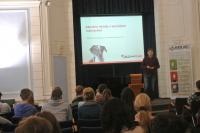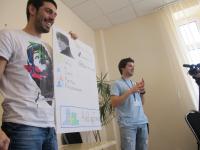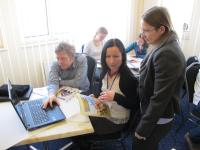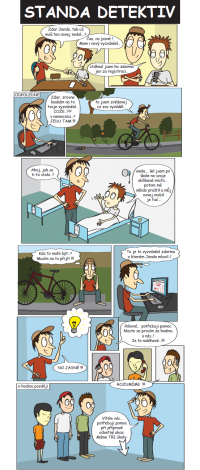

 Certifikovaný program primární
Certifikovaný program primárníprevence pro žáky MŠMT
 Akreditované školení
Akreditované školenípro učitele MŠMT
 3. místo za ČR v soutěži Evropská
3. místo za ČR v soutěži Evropskásíť prevence kriminality (EUCPN)
- Aktivity září a říjen
- Kraj pro bezpečný internet 2024
- Community volunteering against cyber bullying
- Sticks and Stones
- Šablony - Zvyšování kvality neformálního vzdělávání v Moravskoslezském kraji
- European Solidarity Corps
- ff
- Yes We Can !
- Bezpečnější internet s Ministerstvem zdravotnictví
- Tolerance vede ke štěstí
- Ostrava - město odpovědných škol 2022
- Bezpečný internet s ČSOB II.
- trikem proti kyberšikaně
- Kyberšikana má červenou 2022
- S kyberšikanou v duši II.
- Umění startu
- S kyberšikanou v duši
- S kyberšikanou pod kůží
- Řidičský průkaz internetového surfaře
Help
More and more children spend their free time on the Internet. The danger that they will become victims of their rash behaviour is thus very high. They would be safer if they followed advice that is given in the Advice part. Many children, however, don’t follow these rules and even their parents don’t check them. The basic problem is that many parents just don’t understand the Internet, its protection and principles of safe behaviour. Some parents forbid the Internet generally, some check their children randomly and some never. Parents should basically take care about safety of their children. “Almost a half of 14 – 15 years old children have sent someone their pictures and 14% of them would meet a person they know only from the Internet,” Tomáš Rychecký from TNS AISA agency listed some examples after an extensive research on children’s behaviour on the Internet. Don’t you believe? Let’s have a look at similar recent researches.
Many researches have been done so far but let’s talk about the last one that was made in May 2009 by TNS AISA agency for the Naše dítě Foundation. The results were shocking. 319 families with children from 10 to 15 took part in the research. The list bellow summarizes the recent researches’ results. The first part belongs to children’s behaviour on the Internet and then it is focused on parents. Both groups agreed just on the fact that the Internet is a useful source of information.
Children in the age of 10 – 15 and their behaviour on the Internet
- Average time spent on the Internet is 1,5 hour per working day and it increases by about an hour (i.e. 2,5 hours) at the weekend
- 50% of the children have a PC with an Internet connection in their room, so they can surf the Internet without being checked
- 70% of children in the age of 14 –15 years join newsgroups
- 37% of children communicate with unknown people whose identity is hidden and the children know them just from the Internet
- 14% of children at the age of 14 – 15 even meet these unknown people!
- About 50% of the children share their pictures
- More than a third of the children shares their personal and contact information with unknown people from the Internet
- 20% of the children that experienced something terrifying didn’t open up to their parents
Behaviour of parents
- 17% of parents don’t check their children’s activities on the Internet. More than a half do just random checks
- Only 8% of the parents use adult lock programs to limit the access of their children to inappropriate websites
- A fifth of the parents of 15 years old children don’t check activities of their children on the Internet and only a half of them have some rules for the Internet use
Results of other researches
- Children are aware of the fact that they have better knowledge of the Internet use and they can use it more skilfully
- Majority of children know they shouldn’t share any personal information with anyone but in spite of that they do share much more information than their parents would let them
- 14% of children have met someone they know only from the Internet but only 4% of their parents admit it could happen
- 44% of the children using the Internet visited pornographically oriented websites
- 30% of children visited websites with violent content but only 15% admit this fact
- Many parents share their children’s pictures on the Internet
- Many advertisements on children clothes includes pictures of children and also addresses are included
Children are essentially more trustful and naive because they are immature and this is the fact that plays a key role in cases of child abuse over the Internet. They often think that nothing can happen to them. Despite the fact children are taught about dangerous behaviour (Civics, Informatics) they are willing to meet anonymous people. The head of the Internet sever Alik.cz thinks that children “are convinced very long that they have everything under the control – so why couldn’t they share a piece of information?” This behaviour is also based on the recent discussion organised by MF DNES editor on the Alik.cz server. Ela, an 11 years old girl, said: “If he wanted to invite me somewhere, I would go but only to populated places and during the day.” The sever Alik.cz is focused on children from 4 to 12 years and it also tries to advise children how to use the Internet safely. Still, there was the answer of Martina, who wouldn’t go anywhere with an unknown person but if she was in the contact for some time with this person, she would accept the invitation. Majority of these children said that they don’t share information with unknown people because it is dangerous. On the other hand, the above-mentioned researches proved something else. It is no secret that there are names and picture galleries on websites such as Libimseti.cz or Lide.cz. Šárka, an 18 years old girl, also confessed her experience: “I used to visit Libimseti.cz website where I shared my first name, age, my hometown and several pictures. A strange man started to write me not exactly polite things.” Ety talked about another experience: “Once I met a boy that wanted to date me. I sent him my picture… And then I noticed his year of birth. It was 1967. So I chatted with a man older than my dad.” She quit the conversation with him but she continues chatting with unknown people. She, however, wouldn’t share personal information anymore. Kikina, an 11 years old girl, said: “I like chatting. Whenever I ask people to chat with me, usually some pervert answers and asks me if I have a web cam and if I want to see how he…” Of course, it doesn’t need to be a paedophile in each case, also same old children try to provoke and cross the line. According to these randomly selected stories, it is clear that danger is literally round every virtual corner. It isn’t an alarming rumour, it is reality. This fact is also supported by the case of Jiří Kadrnožka, 28 who tried to lurk out an 11 years old girl.
Even though children are well informed about dangerous behaviour, they consider it forbidden fruit and they want to reveal secrets. Children suffer from their naivety, trustfulness and inability to see the situation from the adult point of view. Václava Masáková, a psychologist, states: “The problem is that children in trouble or meeting something inappropriate are afraid to tell their parents.” According to Masáková, older children tend to break restrictions more often. “Parents also give less orders because they have this feeling that what was once said is still valid,” the psychologist thinks. In this case, consistency is very important for parents. It isn’t enough just to check the history of websites, because it is possible to erase it. If you want to see some advice, go to the Advice for parents part.


.jpg)










.jpg)

